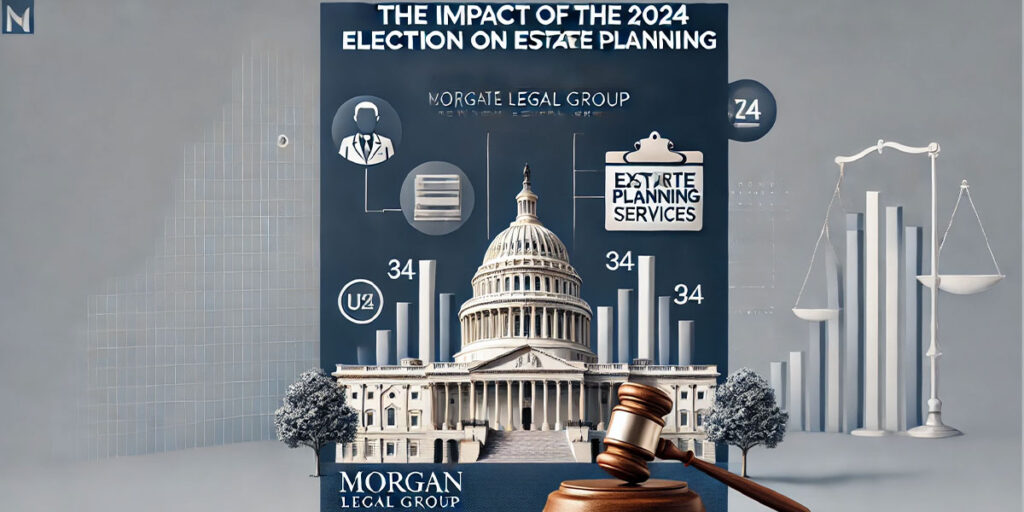The Impact of the 2024 Election on Estate Planning: A New York Perspective
As experienced estate planning attorneys, we at Morgan Legal Group recognize the significant uncertainty surrounding tax laws and the need for a proactive approach, particularly due to the 2024 elections. Specifically, elections can bring about policy shifts that may directly affect estate tax laws and overall estate planning strategies, both at the federal and state levels. Therefore, New York residents must be aware of these potential changes and take steps to protect their estates from any negative impacts. Failing to be proactive with your planning could result in unnecessary tax liabilities and unintended consequences for your beneficiaries.
Understanding the Interplay Between Elections and Estate Planning
Firstly, it’s important to grasp the connection between elections and estate planning, especially in New York. Notably, the party in power can often enact changes to tax policies, including those impacting estate taxes. Specifically, this can lead to fluctuations in exemption amounts, tax rates, and even the types of assets that are subject to taxation. Thus, the 2024 election will create a range of potential outcomes that may affect estate planning strategies in New York.
- Tax Policy Changes: First, elections can lead to tax policy shifts, affecting federal and New York estate taxes.
- Exemption Adjustments: Second, changes in government can lead to modifications in estate tax exemption amounts, impacting many estates.
- Tax Rate Modifications: Third, tax rates can be subject to change, requiring adjustments to estate planning strategies.
- Estate Planning Tool Impacts: Also, law changes might affect the availability and effectiveness of estate planning tools.
The Federal Estate Tax Landscape and Election Outcomes
One of the most significant impacts of a federal election is on federal estate tax laws. Specifically, the federal estate tax applies to transferring assets from a deceased person to their heirs, and the rates and exemption amounts can be changed depending on the party in power. Therefore, understanding which party has won the election can help to anticipate potential changes, and plan for them proactively. For instance:
- Potential for Increased Exemption: Notably, a shift towards a more conservative government could see a permanent increase in estate tax exemptions.
- Possible Lower Tax Rates: Conversely, changes in the tax rates, in general, are often a subject of elections and could either increase or decrease, depending on who is elected.
- Sunset of Current Law: Additionally, depending on election results, certain tax provisions may expire if not extended by legislation.
How New York State Law May Be Affected
Beyond federal changes, New York State’s own estate tax laws may also be influenced by the 2024 elections and the state’s political environment. Specifically, changes at the state level can include the tax rates, exemption amounts, and even the rules for estate administration. Therefore, it’s essential to follow both federal and New York State changes to ensure a well-rounded estate plan.
- State Tax Rates and Exemptions: Specifically, New York has its own unique laws, separate from the federal government.
- New York Tax “Cliff”: In particular, the threshold of 105% of the exemption, where the whole estate becomes taxable, should be a consideration.
- State-Specific Estate Planning Tools: Also, there are New York State-specific legal tools that could be impacted by election outcomes.
Potential Policy Changes and Their Impact on Estate Planning
With the 2024 election results in hand, several policy changes may come up that can influence your estate planning. Specifically, these include changes to exemption levels, tax rates, and how specific assets are taxed. Therefore, you should be prepared to make changes to your plan:
- Exemption Reductions: For instance, a lower estate tax exemption will cause more estates to become taxable.
- Increased Tax Rates: Higher tax rates on larger estates may increase tax liability.
- Changes to Trust Rules: Also, laws may affect how trusts, specifically irrevocable trusts, can be utilized in New York.
- Modifications to Gifting Strategies: Furthermore, new limitations on gifting could impact your strategy.
The Importance of Proactive Estate Planning in Light of Election Uncertainty
Given the uncertainty brought about by any election, proactive estate planning becomes even more vital. Specifically, by having a well-structured estate plan, you can better navigate potential changes and protect your estate from any unforeseen negative consequences. Therefore, it’s not the time to wait, but rather, now is the time to act by:
- Mitigating Tax Liabilities: Firstly, proactive planning helps you to manage your tax liabilities in the event of a change in law.
- Asset Protection: Also, a well-structured plan protects your assets for future generations.
- Ensuring Your Wishes are Met: Moreover, proactive planning guarantees that your personal goals and wishes are met, no matter the political landscape.
Strategies to Consider Before and After the 2024 Election
In the lead-up to and aftermath of the 2024 election, there are several strategic steps that New York residents can take to safeguard their estates. Specifically, these steps include reviewing current estate plans, considering irrevocable trusts, and taking advantage of gifting and charitable contribution strategies while they still exist. Therefore, act proactively by implementing:
- Review Current Estate Plans: Firstly, review your current will or trust documents with an experienced attorney.
- Irrevocable Trusts: Use irrevocable trusts to remove assets from your taxable estate before the laws change.
- Gifting Strategies: Third, make annual gifts up to the current annual exclusion while you are still allowed to do so.
- Charitable Giving: Fourth, use charitable giving strategies to reduce your estate and support your values.
- Life Insurance Planning: Finally, utilize life insurance to cover potential tax liabilities and support loved ones.
How to Maximize Gifting Before Any Potential Law Changes
Gifting strategies are a useful tool to lower the value of your estate. Specifically, before any possible changes in laws, there are specific strategies you may utilize to reduce your taxable estate, as long as they comply with New York law. Therefore, keep these options in mind before any potential changes take place:
- Annual Gift Exclusion: First, take advantage of the annual gift tax exclusion and gift up to the limit to as many beneficiaries as possible.
- Lifetime Exemption Use: Secondly, consider using your lifetime gift tax exemption if you need to transfer a large amount before any rules change.
- Gifts to Trusts: Third, gift assets into a trust for greater asset protection.
Charitable Contributions as an Estate Planning Tool
Charitable giving is a way to reduce your taxable estate while supporting the causes you care about. Specifically, you can utilize many different methods to make a charitable contribution, and you should speak with your attorney to see which method best fits your needs and goals. Therefore, use this strategy while it is still available and before any potential changes in laws take place:
- Direct Donations: Notably, make direct gifts to qualified charitable organizations that meet your goals.
- Charitable Trusts: Furthermore, set up a charitable remainder trust (CRT) or a charitable lead trust (CLT).
- Donor-Advised Funds: Also, consider using donor-advised funds to have flexibility in how your funds are used over time.
The Role of Trusts in a Changing Political Landscape
Trusts remain a valuable tool in estate planning and can be especially useful during periods of political uncertainty and potential changes in tax laws. Specifically, trusts, when planned carefully, can offer a certain level of asset protection, control, and tax benefits. Therefore, consider which type of trust is best for your needs, in light of the possible political shifts coming in 2024:
- Revocable Trusts: Primarily, revocable trusts provide flexibility while avoiding probate but might not protect assets from estate tax.
- Irrevocable Trusts: Additionally, irrevocable trusts offer increased asset protection and tax benefits but are less flexible.
- Special Needs Trusts: Furthermore, special needs trusts ensure that your loved ones with disabilities are financially protected without jeopardizing their government benefits eligibility.
Life Insurance Strategies for Estate Planning
Life insurance is another method to protect your estate and legacy, and it can help cover potential estate tax liabilities or provide income for beneficiaries. Specifically, policies can be placed into an Irrevocable Life Insurance Trust (ILIT) to avoid estate tax inclusion. Therefore, consider these strategies before changes in the laws take place:
- ILIT: First, set up an Irrevocable Life Insurance Trust (ILIT) to remove life insurance from your taxable estate.
- Covering Estate Taxes: Second, use life insurance policies to create liquidity to pay potential tax bills.
- Beneficiary Support: Third, utilize life insurance to provide for your beneficiaries when you are gone.
Navigating Potential State-Level Changes
In addition to the federal estate tax, it is essential to be aware of any possible changes in New York State’s estate tax laws. Specifically, there is no way to predict how these laws may change, but it is important to be aware of the possibility and how your plan might be affected. Therefore, be sure to remain flexible and ready to make changes as needed:
- Stay Informed: First, follow all state-level news and consult with a professional about how possible changes might affect you.
- Flexibility: Second, create a flexible estate plan that can change over time.
- New York Specific Strategies: Third, work with an attorney who knows the specific laws of New York State.
The Importance of Working with an Experienced Estate Planning Attorney
In times of political uncertainty, partnering with an experienced estate planning attorney, like those at Morgan Legal Group, is more vital than ever. Specifically, our attorneys have a deep understanding of federal and New York estate tax laws and the flexibility to adapt as new information arises. Therefore, working with our firm will help you to:
- Expertise: First, you will have access to expert advice on both New York and federal tax laws.
- Personalized Approach: Second, your individual needs and goals will be addressed.
- Proactive Strategies: Third, you will receive strategic advice that allows you to mitigate potential tax liabilities.
- Peace of Mind: Finally, you will have the peace of mind that comes from having a sound legal strategy.
Common Estate Planning Mistakes to Avoid
Even with the best intentions, some common mistakes can undermine your estate plan. Specifically, avoiding these mistakes is important so you do not jeopardize your plan. Therefore, avoid these common errors:
- Delaying Planning: Firstly, putting off planning until the last minute can limit your options.
- Relying on Inaccurate Information: Secondly, using incomplete or inaccurate information can make it difficult to make informed decisions.
- Failing to Update: Third, not regularly reviewing and updating your estate plan to address any changes to your goals or new legal rules.
- Not Considering Both State and Federal Law: Finally, neglecting either the federal rules or the rules of the state of New York can undermine your entire plan.
The Importance of Regular Reviews of Your Estate Plan
Finally, estate planning should be treated as a dynamic, changeable, ongoing process that should be reviewed at least annually. Specifically, changes in your life, such as marriage, divorce, birth, or death, require adjustments to your estate planning documents and tax laws. Therefore, keep these steps in mind for reviewing your plan regularly:
- Annual Review: Firstly, schedule an annual review of your documents with your attorney.
- Life Changes: Secondly, make updates whenever there are major changes to your life or family.
- Legal Changes: Thirdly, stay on top of changes to tax laws that may impact your plan.
Contact Morgan Legal Group Today
In conclusion, the 2024 election underscores the need for proactive and adaptable estate planning strategies in New York. Specifically, by remaining informed, utilizing tools like trusts and life insurance, taking advantage of gifting and charitable contribution strategies, and working with Morgan Legal Group, you will be well-prepared to protect your estate and ensure your legacy. Therefore, take the first step to safeguard your future by contacting us to discuss your estate planning needs.
So, reach out today to secure your financial future.









